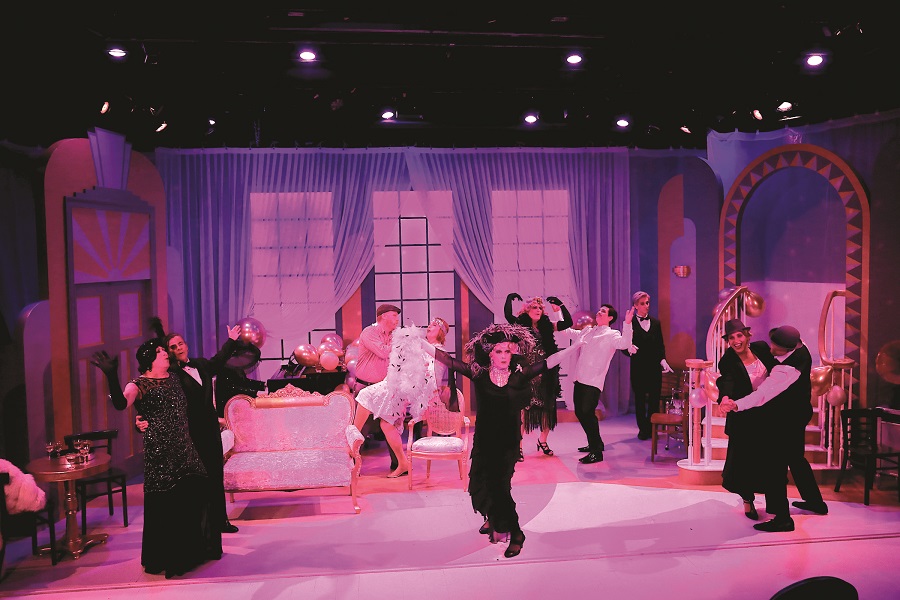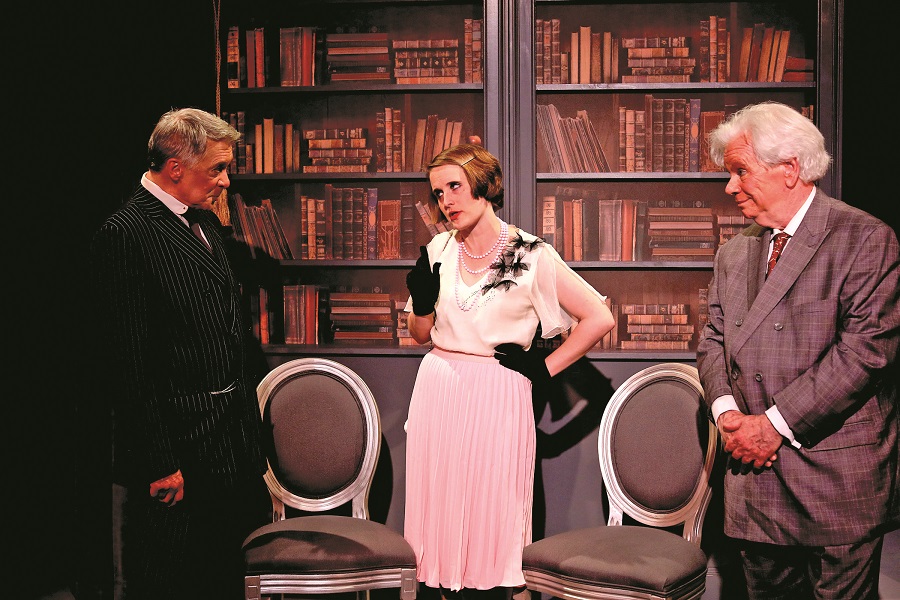“This side’s Friday,” vamp extraordinaire Mae West once quipped, pointing to her upper right thigh, then, pointing to her left thigh, “This side’s Sunday. Why don’t you come see me over the weekend?”
Well, why don’t we? Outer Cape fans of scandal and debauchery can come see a funny and stunningly honest stage play that West wrote in the late 1920s, focusing on homosexuality, on any Friday through Sunday (and Thursday, too) through June 5 (Pride Weekend) at the Provincetown Theater.

The company’s artistic director, David Drake, had originally meant for The Drag to open the 2020 season, which was postponed by the coronavirus pandemic. And now it’s here, back indoors, with Covid protocols (vaccinations checked, audience masked), in a revelatory production that Drake has refashioned for today’s audiences. He originally chose it, he has said, to fortify us against the right-wing backlash unleashed by the Trump presidency. And in 2022, with legislative and court actions further threatening sexual and gender minorities, that fortification is as necessary as ever.
West was a champion of women’s sexual freedom throughout her career. At a young age, she rose from burlesque to Broadway, and, finally, in the 1930s, to Hollywood, where she quickly became the highest-paid star on studio contract. She was not exceptionally pretty, but her figure was voluptuous, and her manner was forthright, clever, and confident in expressing sexual desire. Her fame was self-made: West wrote most of her own material, and she scoffed at those in power who wished to silence her — she turned attempts to censor her into self-promotion.
This worked with her hit play Sex, for which she was temporarily jailed. But it failed for The Drag, which was shut down by authorities in out-of-town tryouts in 1927 and never made it to Broadway. The 1935 Hays Code in Hollywood eventually did squelch her screen voice, and in the 1940s, she returned to live concerts and theater. She died in 1980, at age 87, having directed herself in the film Sextette only a few years earlier.
During the Jazz Age, West was friendly with gay men and lesbians, and sympathetic to their lives as pariahs. Her humor and her own show-business persona were deeply influenced by drag queens of the era. The Drag can be seen as a form of payback. She wrote it but didn’t cast herself in it. It was a gift to her queer friends.
In this Provincetown production, the play, at the ripe old age of 95, feels remarkably modern. Drake, as dramaturge, has streamlined West’s dialogue and eliminated distracting and dated elements of the plot. The Jazz Age was the 20th century’s first major era of sexual revolution, and West, in The Drag, details contrasting approaches to homosexuality at the time, particularly in discussions between a doctor and judge.

The judge, played by Nicholas Dorr, is the father of the play’s central character, Rolly Kingsbury (Thom Markee), who is newly married to Clair (Racine Oxtoby), whose father is the doctor (Bill Salem). The judge advocates merciless punishment for depraved “inverts,” and the doctor, in contrast, proposes compassion and treatment. Ironically, Rolly, the moralistic judge’s son, is gay and unrepentant, living out his passions on the down-low. He’s smitten with a handsome architect he has hired, Allen Grayson (Nathan Butera), who is actually in love with Rolly’s wife, Clair (as she is with him).
Further complicating issues is David Caldwell (Jameson Redding), a spurned lover of Rolly’s, who seeks treatment with Dr. Richmond.
There are no real leads in the play’s populous ensemble, but several performances are standouts: Racine Oxtoby, as Clair, hits just the right tone as the depressed damsel at the center of everyone’s attention; Eric Oxtoby, as an inspector investigating a shooting at Rolly’s second-act party, is an assuredly sober presence; Scott Cunningham, a last-minute fill-in as Rolly’s friend Clem Hathaway, is smooth and engaging in and out of drag; Alex Juchniewich, as Rolly’s friend Hal Swenson, is hilarious in a dress and hat, as is Stephen Carey, who appears as a party guest named Hell’s Kitchen Kate; and Jameson Redding, as the gay fling who won’t be discarded, dials up the melodrama of his situation without going too far.
Drake directs with aplomb, and though the humor is a tad creaky, the philosophical arguments a bit musty, and the ending and dénouement somewhat abrupt, he preserves the satire and the common-sense humanity in West’s approach that keeps it relevant. Ellen Rousseau’s set arrives straight out of a Fred-and-Ginger musical, and the two acts in two hours whiz by quickly and energetically — no small feat with a large cast of local talent.
The Drag has a comic breeziness that makes it an ideal spring re-introduction to a season of great theater. It’s important as LGBTQ history and reminds us of just how courageous and insightful an artist Mae West was.
Drama Queens
The event: The Drag, a play by Mae West
The time: Thursday through Saturday at 7 p.m.; Sunday at 2 p.m.; through June 5
The place: Provincetown Theater, 238 Bradford St.
The cost: $40; provincetowntheater.org, or 508-487-7487
